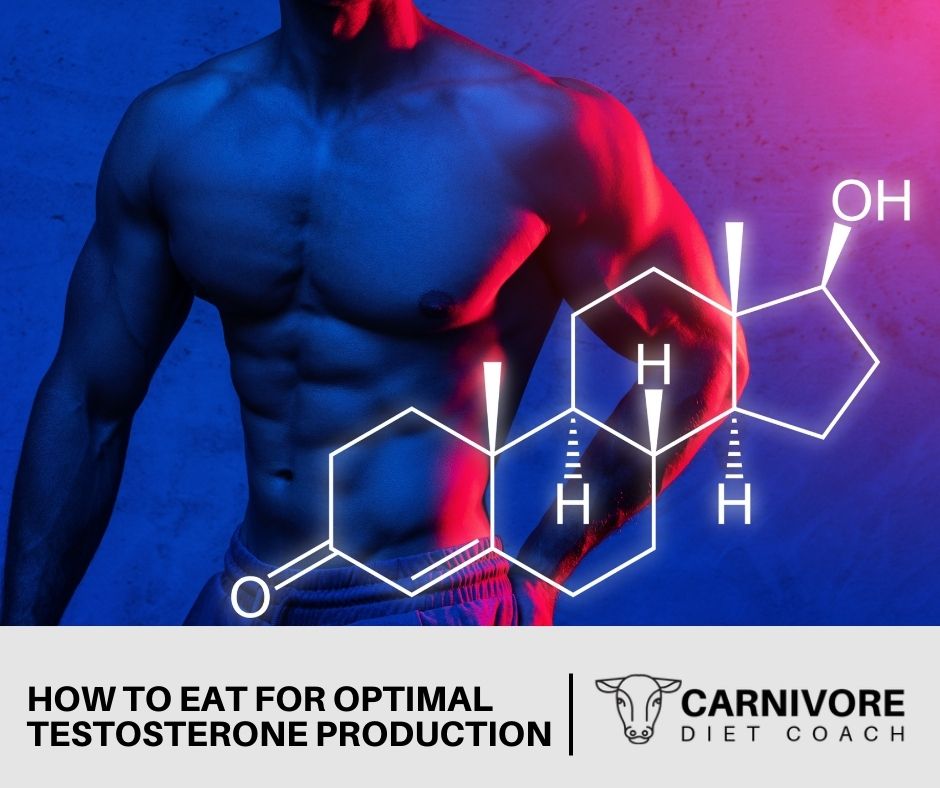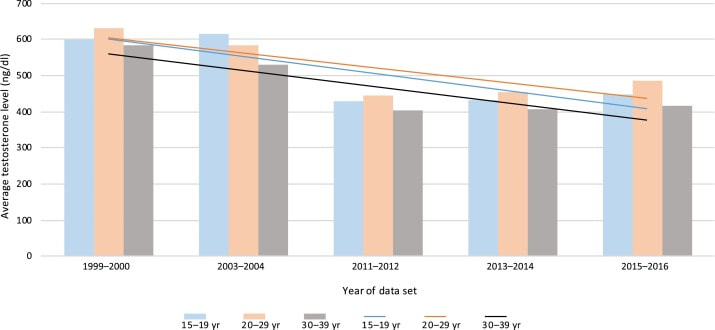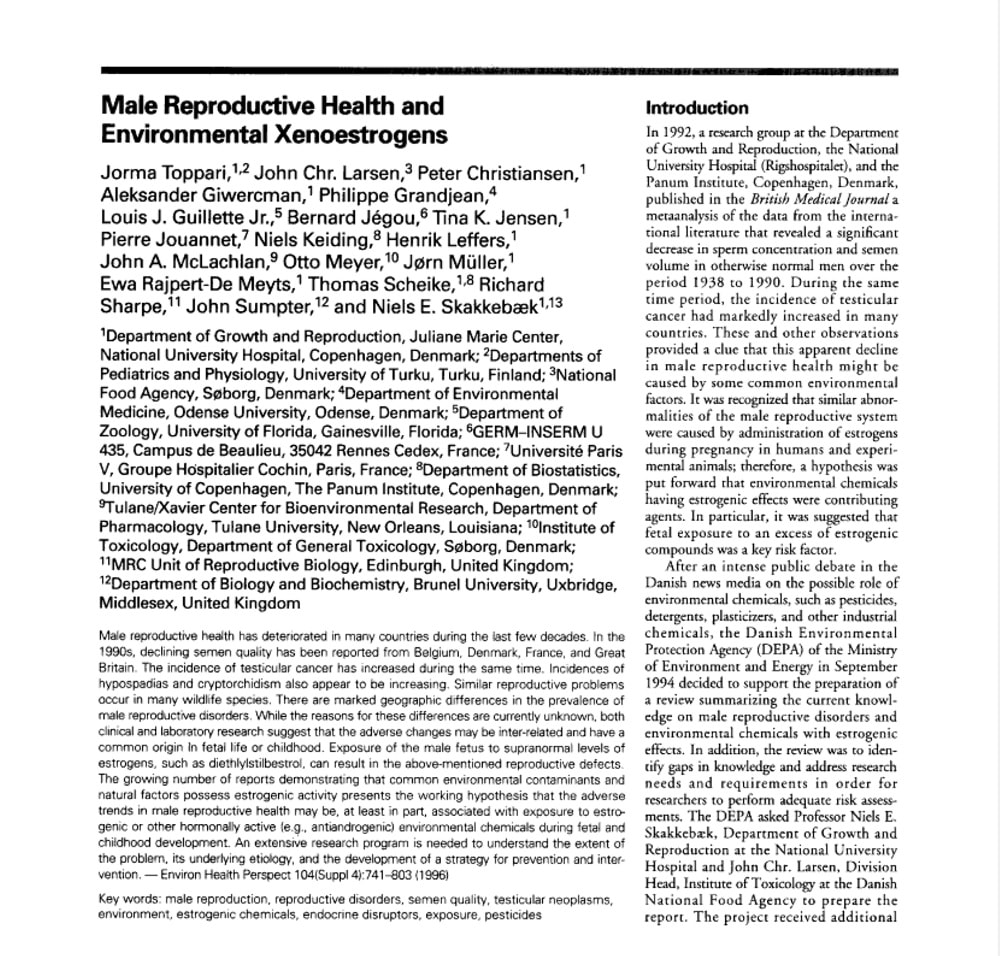|
THE COMPLETE
CARNIVORE DIET GUIDE
Learn how to lose weight, fix your gut and cure autoimmune symptoms with our free Carnivore Diet guide.
|
|
Testosterone is a hormone that is found in men as well as in countless other animals. Testosterone is the male sex hormone and is primarily produced in the testicles. However, women's ovaries also produce testosterone, albeit in far lower quantities. Testosterone has an impact on both physical and mental health. Through puberty, testosterone begins to increase dramatically and then starts to decrease after the age of 30. Testosterone impacts various elements of sexual health, such as sex drive and sperm production. However, it can also cause bone or muscle mass changes and affect red blood cell production. Changes in testosterone can also impact a man's mood. If you have low levels of testosterone, you may notice symptoms including:
While aging will lead to decreases in testosterone, other factors can also play a part. For instance, certain medical conditions, including kidney disease and alcoholism, may cause drops in testosterone. The good news is that research shows you can improve your testosterone levels, including eating a diet ideal for optimal testosterone production. Testosterone Levels Are Dropping One study has found that testosterone for men between the ages of 45 and 80 dropped 1% every year between 1987 and 2004. Another study found that between 1999 and 2016, the average testosterone level fell 1.8 percent per year for men of the average age of 27. These studies suggest that the average drop in testosterone levels is increasing over time and impacting younger men more than older men. On average, men's testosterone levels have dropped by approximately 20% over the last 20 years. It's worth noting that this isn't a new trend. However, as it stands, the average 22-year-old man today has a testosterone level equivalent to a 67-year-old man in 2000. Now that paints a worrying picture for future generations. How to Check Your Testosterone If you are worried that your testosterone levels are lower than they should be or you are experiencing any of the symptoms mentioned above, consider getting your testosterone levels checked. At-home testosterone checks are also available to complete the test yourself. As such, you don't have to worry about booking an appointment with a doctor. However, if you are particularly concerned, you can also speak with a health professional. They will complete a check on your testosterone levels for you and determine whether it is lower than usual for your age. Whether using a home test or you visit a doctor, the only way to check testosterone levels is with a blood sample. Why is testosterone dropping? Researchers believe that testosterone levels may decrease over time for several reasons. Let's take a look at some of the factors that are contributing to the drop in testosterone levels in men. Xenoestrogens Experts suggest that one of the leading factors for lower levels of testosterone could be environmental estrogens. Xenoestrogens are synthetic molecules with the same impact on the body as the standard form of estrogen. These are found in a wide range of plastic products, pesticides, and cleaning products available on the general consumer market. The problem is that the body determines how much testosterone should be produced by the level of estrogen present. To avoid these molecules, buying organic produce and meats is essential. You must also avoid plastic as much as possible and drink filtered water. Phytoestrogens The other type of environmental estrogen is phytoestrogens. These are found in plants. There is some debate as to whether these have the same negative impact on testosterone levels as xenoestrogen. However, in controlled scientific studies, it has been shown that phytoestrogens lower testosterone levels in mice. Certain foods, including sesame seeds, garlic, ginseng, and oats, have high levels of phytoestrogens. As such, you should be more mindful of your intake of those food items and limit it in some instances. Eating Too Few Calories Your exercise and fitness routine may also impact testosterone levels. For instance, you might have tried intermittent fasting. IF involves consuming all the calories within a certain amount of time each day for better health and increased levels of weight loss. Research into fasting suggests that it could cause lower levels of testosterone due to caloric restriction. If you cut the calories your body requires for recovery and growth, it may respond by slowing down hormone production levels. While research is still limited, experts agree that fasting or eating too few calories for an extended period will not boost testosterone levels. Eating Too Many Calories Another study has found that obese men are more than 8 times more likely to have lower testosterone levels than males with a healthy weight. Indeed, obesity is commonly viewed as the most effective predictor for determining testosterone levels in men. If you are overweight, total testosterone decreases due to reductions in globulin throughout the body. This is responsible for binding the sex hormone. Severe levels of obesity can also cause reductions in free testosterone levels because of hypothalamic–pituitary‐testicular HPT axis suppression. Protein Intake So we established that your aim should be to find a calorie intake that helps you achieve your fitness goals while not having too much impact on your testosterone levels. Your macronutrient ratio can also make a difference, starting with protein intake. While research is limited, there is evidence that both very high and too low protein intake can cause a drop in testosterone levels. Getting a healthy amount of protein from foods such as organic meat is essential. Men attempting to build muscle may dramatically increase their protein intake. However, research suggests that this could harm levels of testosterone. According to recent studies, too much protein can reduce testosterone levels as much as too little by altering the levels of testosterone in the body. When protein intake surpassed 35% of the daily total calorie intake, it reduced testosterone levels by 37% in one study. Balancing your diet with the right amount of protein is essential. You generally want to consume enough protein to prevent lean muscle tissue loss as much as possible, even if you're eating at a calorie deficit for weight loss. So the numbers to keep in mind are to stay below 35% of your total daily calories when it comes to protein intake but also ensure you eat at least 1.2g of protein for every kg of body weight per day or even up to 2.2g if you train hard every day. The source of protein in your diet is also crucial, especially if we consider the impact of phytoestrogens found in plants. So, working toward a carnivore diet or one primarily focused on animal protein will help you increase your testosterone levels. Carbohydrates You also need to ensure you are getting enough carbohydrates in your diet. If you have a low-carbohydrate diet, you may be more at risk of increased cortisol levels and a decrease in free testosterone levels in the first few weeks. However, it can start to normalize after that. Although research isn't conclusive, focusing on a balance is also crucial here. The more pressing issue with carbohydrates is the polyphenol content in plants connected with their phytoestrogen content. So, you might want to choose carbohydrate sources that do better in that sense, like honey or fruits in general. These will provide you with the carbs that you need without the risk of impacting your estrogen levels. Vitamins and Minerals Some minerals and vitamins are likely to increase testosterone levels. One example of this is vitamin D. Vitamin D supports healthy metabolism and promotes healthy levels of bone development. It can also ensure that the immune system continues to function effectively. Studies have shown that vitamin D may positively impact testosterone levels. One study found that supplementation of vitamin D increased free levels of testosterone compared with those who received a placebo supplement. Zinc might also have a positive impact on testosterone levels. Both oysters and shellfish or a brilliant sources of zinc. Research suggests that this may be because zinc inhibits aromatase. This enzyme is responsible for converting levels of testosterone into estrogen. The right level of nutrition for testosterone levels is a critical consideration and why you need to focus on the best diet. Eating healthy animal fat sources like fatty fish, organic meat, and seafood is the best way to ensure you get enough micronutrients, both water and fat-soluble vitamins, and even zinc. Supplements Getting all the vitamins and minerals your body needs can be challenging, particularly if you are worried that your testosterone levels are lower than usual. Specific minerals, like magnesium, boron, or even iodine, might be more difficult to absorb from your food, and you might not live near a mineral-rich spring water fountain. If so, you may consider using supplements to increase your mineral levels if needed. Conclusion While the general drops in testosterone levels for the average male are concerning, there are steps you can take to ensure this issue doesn't impact you. Generally speaking, this is all about making the right changes to your lifestyle.
You should avoid environmental estrogens as much as possible and pay particular attention to xenoestrogens that could impact your health, found in plastics, non-organic food, and water. You should also provide your body with everything it needs through a natural, balanced diet. The proper diet will incredibly impact your general health and help ensure that testosterone remains at the right level in your body.
0 Comments
Leave a Reply. |
Carnivore Diet Recipes & Meal PlansOur Trusted Partners
Popular Guides
|








